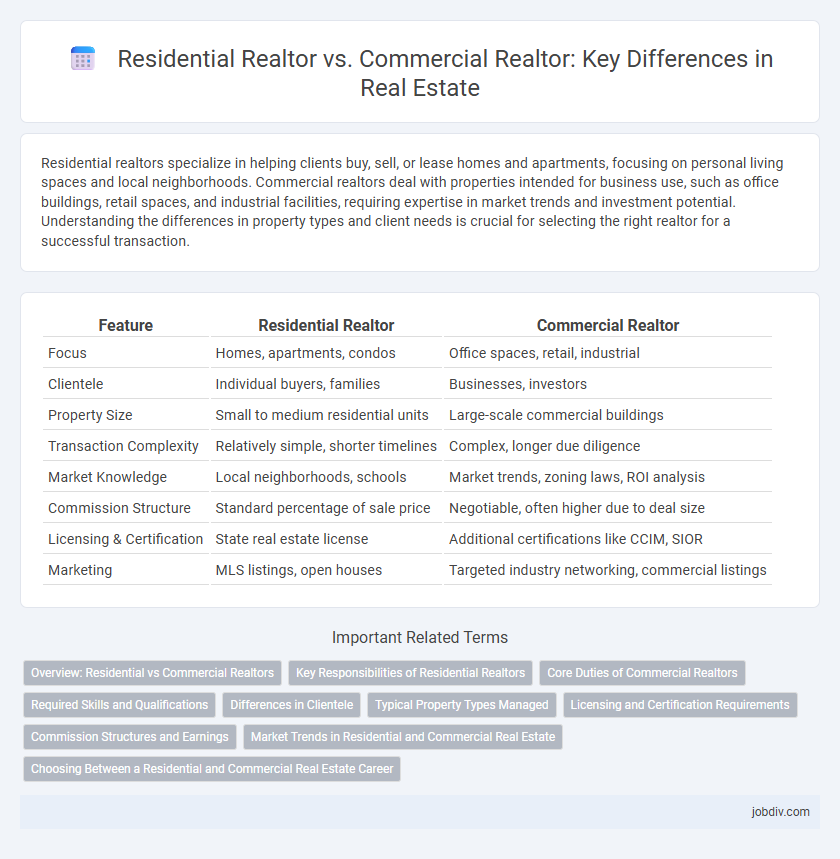Residential realtors specialize in helping clients buy, sell, or lease homes and apartments, focusing on personal living spaces and local neighborhoods. Commercial realtors deal with properties intended for business use, such as office buildings, retail spaces, and industrial facilities, requiring expertise in market trends and investment potential. Understanding the differences in property types and client needs is crucial for selecting the right realtor for a successful transaction.
Table of Comparison
| Feature | Residential Realtor | Commercial Realtor |
|---|---|---|
| Focus | Homes, apartments, condos | Office spaces, retail, industrial |
| Clientele | Individual buyers, families | Businesses, investors |
| Property Size | Small to medium residential units | Large-scale commercial buildings |
| Transaction Complexity | Relatively simple, shorter timelines | Complex, longer due diligence |
| Market Knowledge | Local neighborhoods, schools | Market trends, zoning laws, ROI analysis |
| Commission Structure | Standard percentage of sale price | Negotiable, often higher due to deal size |
| Licensing & Certification | State real estate license | Additional certifications like CCIM, SIOR |
| Marketing | MLS listings, open houses | Targeted industry networking, commercial listings |
Overview: Residential vs Commercial Realtors
Residential realtors specialize in helping clients buy, sell, or rent homes, apartments, and other living spaces, focusing on properties designed for personal use. Commercial realtors handle transactions involving office buildings, retail spaces, industrial properties, and land for business purposes, often requiring knowledge of market trends, zoning laws, and investment analysis. The distinction lies in the property type and client goals, with residential realtors prioritizing individual homeowners and commercial realtors catering to business investors and developers.
Key Responsibilities of Residential Realtors
Residential realtors specialize in assisting clients with buying, selling, and renting homes, focusing on single-family houses, condos, and townhomes. Their key responsibilities include conducting market analysis, staging properties, coordinating home inspections, and negotiating sale prices to meet clients' personal lifestyle needs. Expertise in local neighborhoods, school districts, and financing options enables residential realtors to provide tailored advice for individuals and families.
Core Duties of Commercial Realtors
Commercial realtors specialize in facilitating transactions involving office buildings, retail spaces, industrial properties, and multi-family apartments, focusing on leasing, sales, and property management. Their core duties include conducting market analysis to determine property value trends, negotiating complex contracts with clients and investors, and coordinating due diligence processes to ensure compliance and mitigate risks. Unlike residential realtors, commercial agents require expertise in zoning laws, financial modeling, and investment strategies to maximize returns for business clients.
Required Skills and Qualifications
Residential realtors typically require strong interpersonal skills, local market knowledge, and expertise in residential property laws to effectively assist homebuyers and sellers. Commercial realtors must possess advanced financial acumen, understanding of zoning regulations, and expertise in commercial lease agreements to navigate complex transactions involving office buildings, retail spaces, and industrial properties. Both professions often require state licensing, but commercial real estate agents may also benefit from additional certifications like CCIM (Certified Commercial Investment Member) to enhance credibility and marketability.
Differences in Clientele
Residential realtors primarily serve individual buyers and families seeking homes, condominiums, or townhouses for personal use or investment. Commercial realtors work with businesses, investors, and developers interested in properties such as office buildings, retail spaces, warehouses, and industrial facilities. The clientele for residential realtors usually requires assistance with financing options and neighborhood insights, while commercial realtors focus on property income potential, lease agreements, and zoning regulations.
Typical Property Types Managed
Residential realtors primarily manage properties such as single-family homes, condominiums, townhouses, and multi-family residences designed for living purposes. Commercial realtors specialize in property types including office buildings, retail spaces, industrial warehouses, and mixed-use developments intended for business activities. Understanding these distinctions helps clients target the right agent based on the property's functional use and market segment.
Licensing and Certification Requirements
Residential realtors typically require a state real estate license, often completed through pre-licensing courses and passing a state exam, with certifications such as CRS (Certified Residential Specialist) enhancing credibility. Commercial realtors must also have state licensure but benefit from specialized credentials like CCIM (Certified Commercial Investment Member) or SIOR (Society of Industrial and Office Realtors) that focus on investment analysis, market dynamics, and property management. Licensing for both types demands ongoing education, but commercial realtors usually undergo more intensive training related to financial acumen and zoning regulations.
Commission Structures and Earnings
Residential realtors typically earn commissions ranging from 5% to 6% of the property sale price, split between buyer's and seller's agents, with individual earnings varying based on transaction volume and regional market conditions. Commercial realtors often work on lower percentage commissions, usually between 2% and 4%, but earn substantially higher fees due to larger property values and longer sales cycles, sometimes incorporating base fees or retainers. Understanding these commission structures is crucial for agents aiming to maximize income in residential or commercial real estate sectors.
Market Trends in Residential and Commercial Real Estate
Residential real estate markets are primarily influenced by factors such as interest rate fluctuations, demographic shifts, and urbanization trends, driving demand for single-family homes and apartments. Commercial real estate trends are shaped by economic cycles, business expansions, and changing work patterns, affecting office spaces, retail centers, and industrial properties. Realtors specializing in residential properties focus on neighborhood growth and housing affordability, while commercial realtors monitor market indicators like cap rates, vacancy rates, and lease terms to guide investment strategies.
Choosing Between a Residential and Commercial Real Estate Career
Choosing between a residential and commercial real estate career depends on factors such as market knowledge, client interaction, and transaction complexity. Residential realtors typically handle home sales and prioritize emotional client connections, while commercial realtors focus on investment properties requiring expertise in market analysis and financial metrics. Understanding local market trends, commission structures, and personal strengths helps determine the best career path in real estate.
Residential Realtor vs Commercial Realtor Infographic

 jobdiv.com
jobdiv.com